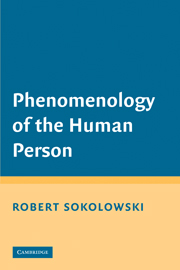Book contents
- Frontmatter
- Contents
- Acknowledgments
- Phenomenology of the Human Person
- Introduction
- PART I THE FORM OF THINKING
- 1 Two Ways of Saying “I”
- 2 Further Kinds of Declaratives
- 3 Linguistic Syntax and Human Reason
- 4 The Person as the Agent of Syntax
- 5 Reason as Public
- 6 Grammatical Signals and Veracity
- PART II THE CONTENT OF THINKING
- PART III THE BODY AND HUMAN ACTION
- PART IV ANCIENTS AND MODERNS
- 19 Conclusion, with Henry James
- Bibliography
- Index
1 - Two Ways of Saying “I”
Published online by Cambridge University Press: 05 June 2012
- Frontmatter
- Contents
- Acknowledgments
- Phenomenology of the Human Person
- Introduction
- PART I THE FORM OF THINKING
- 1 Two Ways of Saying “I”
- 2 Further Kinds of Declaratives
- 3 Linguistic Syntax and Human Reason
- 4 The Person as the Agent of Syntax
- 5 Reason as Public
- 6 Grammatical Signals and Veracity
- PART II THE CONTENT OF THINKING
- PART III THE BODY AND HUMAN ACTION
- PART IV ANCIENTS AND MODERNS
- 19 Conclusion, with Henry James
- Bibliography
- Index
Summary
One could express it this way: In a zoo there could be a sign, “This is a zebra”; but certainly not, “I know that this is a zebra.” “I know” has meaning only when a person utters it. But then it does not matter whether the utterance is, “I know…,” or “This is….”
Ludwig Wittgenstein, On Certainty, §588My observation is a logical and not a psychological one.
§447My purpose is to clarify, philosophically, what human persons are. It is our rationality that makes us persons, and I wish to describe such rationality in action, to show how it is made manifest. If I succeed in doing so, I will have helped exhibit what is distinctive about human beings. I will begin, not by making general remarks or offering broad descriptions, but by targeting a particular human activity, something very definite, and using it as a wedge to open up the dimension of being that is proper to persons. The activity I will target is a special way in which we use the word I and its variants, a special way we use the first person, when we speak. Our rationality and hence our personhood come prominently to light in this usage. This phenomenon can then serve – if I may switch metaphors – as a bridgehead for the exploration of other ways in which our rationality appears.
- Type
- Chapter
- Information
- Phenomenology of the Human Person , pp. 7 - 21Publisher: Cambridge University PressPrint publication year: 2008



